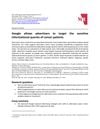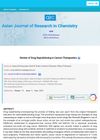 15 citations,
July 2023 in “EClinicalMedicine”
15 citations,
July 2023 in “EClinicalMedicine” ADCs can effectively treat breast cancer but may cause side effects like nausea and hair loss.
13 citations,
March 2021 in “Frontiers in oncology” Reflectance confocal microscopy reliably identifies skin cancer features like horizontal skin tissue sections.
 13 citations,
May 2018 in “Urologic Oncology: Seminars and Original Investigations”
13 citations,
May 2018 in “Urologic Oncology: Seminars and Original Investigations” Finasteride does not prevent bladder cancer.
12 citations,
February 2019 in “Journal of patient-reported outcomes” Patients with HR+/HER2- advanced breast cancer commonly experience fatigue, hair loss, and pain, which significantly affect daily activities.
 12 citations,
March 2016 in “Life Sciences”
12 citations,
March 2016 in “Life Sciences” The new chemotherapy combination of WP 631 and Epothilone B shows enhanced effectiveness against ovarian cancer but requires more research on its safety.
12 citations,
December 2010 in “Journal of thoracic oncology” New treatments for non-small cell lung cancer are being tested, with some already in use, focusing on immune response and targeting cancer cells, but side effects vary.
 9 citations,
May 2019 in “Experimental Cell Research”
9 citations,
May 2019 in “Experimental Cell Research” HPV genes and estradiol increase a cancer-related signaling pathway, which may be targeted for cervical cancer treatment.
 7 citations,
January 2023 in “Journal of Hematology & Oncology”
7 citations,
January 2023 in “Journal of Hematology & Oncology” Using protein degradation to fight cancer drug resistance shows promise but needs more precise targeting and fewer side effects.
 6 citations,
November 2021 in “Oncology Research and Treatment”
6 citations,
November 2021 in “Oncology Research and Treatment” Low Vitamin D receptor levels in breast cancer are linked to worse outcomes and more bone metastases, and could be a marker for prognosis.
6 citations,
June 2016 in “Journal of receptor and signal transduction research” Minoxidil increases calcium levels and kills prostate cancer cells independently of calcium.
 6 citations,
October 2014 in “Experimental Dermatology”
6 citations,
October 2014 in “Experimental Dermatology” Prostaglandins and the enzyme AKR1C3 could play a role in skin cancer and hair loss, and further research is needed to understand these mechanisms.
 6 citations,
January 2010 in “Neoplasma”
6 citations,
January 2010 in “Neoplasma” Certain gene patterns in breast cancer are linked to how active hormone receptors are and could affect patient survival.
 3 citations,
November 2022 in “Advances in Clinical and Experimental Medicine”
3 citations,
November 2022 in “Advances in Clinical and Experimental Medicine” Electric pulse treatments for breast cancer show promise in being safer and more effective, with fewer side effects.
 3 citations,
May 2016 in “International Journal of Research in Ayurveda and Pharmacy”
3 citations,
May 2016 in “International Journal of Research in Ayurveda and Pharmacy” Ayurveda, using herbs like ginger, garlic, and turmeric, can reduce chemo-radiotherapy side effects in cancer patients.
 3 citations,
June 2011 in “Korean Journal of Clinical Oncology”
3 citations,
June 2011 in “Korean Journal of Clinical Oncology” The document concluded that there were no effective ways to prevent hair loss from chemotherapy but treatments were being explored.
 3 citations,
January 2011 in “Wspolczesna Onkologia-Contemporary Oncology”
3 citations,
January 2011 in “Wspolczesna Onkologia-Contemporary Oncology” Scalp hypothermia can prevent chemotherapy-induced hair loss but is not suitable for all patients, and more research is needed to improve prevention methods.
 3 citations,
March 2005 in “The Journal of urology/The journal of urology”
3 citations,
March 2005 in “The Journal of urology/The journal of urology” Dutasteride may help shrink prostate cancer tumors.
2 citations,
May 2020 in “Journal of the American Academy of Dermatology” Using certain hair products may increase breast cancer risk in black women.
 2 citations,
January 2017 in “Annals of Dermatology”
2 citations,
January 2017 in “Annals of Dermatology” Taking 5-alpha reductase inhibitors does not increase breast cancer risk in men.
1 citations,
April 2023 in “Heliyon” Disitamab vedotin and gemcitabine effectively treated bladder cancer without major side effects.
1 citations,
May 2022 in “The FASEB journal” The document concludes that biotin, folate, and RGD peptides are promising for targeting cancer cells with prodrugs, but the conjugates are not yet tested for use.
1 citations,
February 2020 Resveratrol-loaded nanoparticles show promise for lung cancer treatment.
 1 citations,
January 2018 in “Springer eBooks”
1 citations,
January 2018 in “Springer eBooks” The document concludes that scalp cooling and treatments like minoxidil can help manage hair loss from cancer therapy.
 1 citations,
April 2016 in “Journal of The American Academy of Dermatology”
1 citations,
April 2016 in “Journal of The American Academy of Dermatology” Blood pressure medications may increase the risk of skin cancer.
 January 2025 in “Cell Communication and Signaling”
January 2025 in “Cell Communication and Signaling” CXXC5 can both suppress and promote cancer, making it a complex target for treatment.

Google should ban ads targeting cancer patients with sensitive health-related keywords to protect them from misleading information.
 August 2024 in “Asian Journal of Research in Chemistry”
August 2024 in “Asian Journal of Research in Chemistry” Repurposing existing drugs can improve cancer treatment but faces challenges.
April 2024 in “Journal of biomedical and pharmaceutical research” Nanoparticles offer significant benefits over traditional chemotherapy for cancer treatment.
February 2024 in “Frontiers in Cell and Developmental Biology” Eribulin-based chemotherapy is more effective and has fewer side effects for advanced triple-negative breast cancer.
 February 2024 in “BioMetals”
February 2024 in “BioMetals” Heavy metals like arsenic, cadmium, and lead can increase cancer risk and worsen outcomes.




















